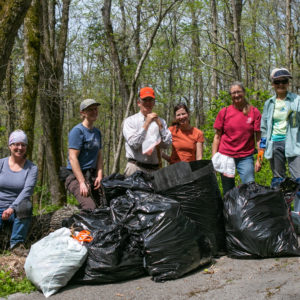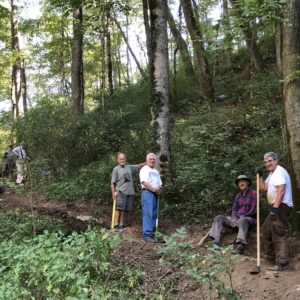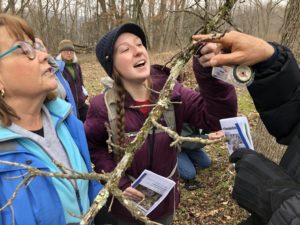
Floracliff volunteers are important stewards and ambassadors for the sanctuary. They help us accomplish restoration goals; share the biodiversity, natural history, and cultural history of the sanctuary; participate in local and global community science projects; maintain our trails, facilities, and infrastructure; and so much more. Through steadfast involvement, our dedicated volunteers come to know the unique features of the sanctuary through all seasons.
Commitment and Training
Floracliff depends on committed weekly volunteers. All new volunteers must complete a Volunteer Orientation. Ongoing activity-specific training is offered to committed volunteers.
New Volunteer Orientations are posted on our events page as they are scheduled. To inquire about available volunteer positions, email info@floracliff.org. New volunteers should be able to commit to volunteering for two or more weekday shifts each month. Current volunteer roles are described below.
Community Group Volunteering
We occasionally host organized groups for seasonal volunteer opportunities on weekdays by request. Activity-specific training is offered onsite.
VOLUNTEER ROLES

Volunteer Conservation Steward
Habitat Restoration – Habitat Restoration Volunteers work on seasonal management of invasive plants in forest and grassland habitats. Hand tools (loppers and handsaws) are used to cut woody shrubs like Amur honeysuckle. These volunteers responsibly apply herbicide to cut stumps and must acquire and maintain a pesticide applicator’s license (sponsored by Floracliff). Habitat Restoration Volunteers also hand-pull invasive plants, including garlic mustard, wintercreeper and Japanese stiltgrass; no pesticide license required. Wednesday mornings, with other weekday mornings occasionally.
Garden Stewardship – Garden Stewardship Volunteers maintain the glade and/or woodland demonstration gardens by the Nature Center and Trail’s End Lodge. We are currently in need of 2-3 experienced gardeners with native plant identification skills who can work independently and commit to at least twice-monthly volunteering. Weekdays, time variable.

Volunteer Grounds Steward
Trail Restoration – Trail Restoration Volunteers maintain Floracliff’s entire trail system using hand tools (loppers, handsaws, cross-cut saws, mattocks) as well as string-trimmers. Stone steps and water bars may be installed to improve visitor experience and reduce impact to the surrounding environment. VOLUNTEER POSITIONS CURRENTLY FILLED
Facilities/Infrastructure Maintenance & Improvement – The Floracliff grounds includes multiple structures – the Nature Center, the Trail’s End Lodge, tool sheds, a historic cabin, and a barn. Other sanctuary infrastructure that needs periodic maintenance, improvement or vegetation clearing includes a 1/3-mile paved driveway, a gravel driveway and parking lot, chain link fences and gates along a roadway, and the boundary around the entire sanctuary. VOLUNTEER POSITIONS CURRENTLY FILLED

Volunteer Naturalist
Community Science – Community Science Volunteers contribute to various local and global community science projects at Floracliff. Photo-documentation of species is used for iNaturalist observations. Community Science Volunteers use photography, apps, and websites to record the data for associated projects. Learn more about our current Community Science Projects. Weekdays, time variable. VOLUNTEER POSITIONS AVAILABLE BASED ON EXPERIENCE
Program Assistant – Floracliff hosts dozens of guided hikes each year, each of which requires assistants who serve as ambassadors for Floracliff, look out for the safety and comfort of participants, and assist the leader as needed. VOLUNTEER POSITIONS CURRENTLY FILLED

Volunteer Educator
Program Leader – To strengthen and diversify Floracliff’s educational programs, we rely on community partners and volunteers who contribute their time and expertise on natural and cultural history topics. Volunteer Educators should be able to develop an organized program, be prepared to speak about their topic, be comfortable with public speaking, and have prior knowledge about the region’s natural history. Volunteer Educators may submit a program title, program description, and brief bio to the Preserve Director for consideration. Day/time variable. VOLUNTEER POSITIONS AVAILABLE BASED ON EXPERIENCE

Special Events and Projects
There are a variety of special events and projects that require volunteer assistance. These may be scheduled for single-day volunteer groups or on an as-needed basis. Special projects may include: litter clean-up, painting, and newsletter packaging. Special events may require help with parking, hosting visitors, food preparation, photography, and clean-up before and after events. Day/time variable. Positions available based on experience.

